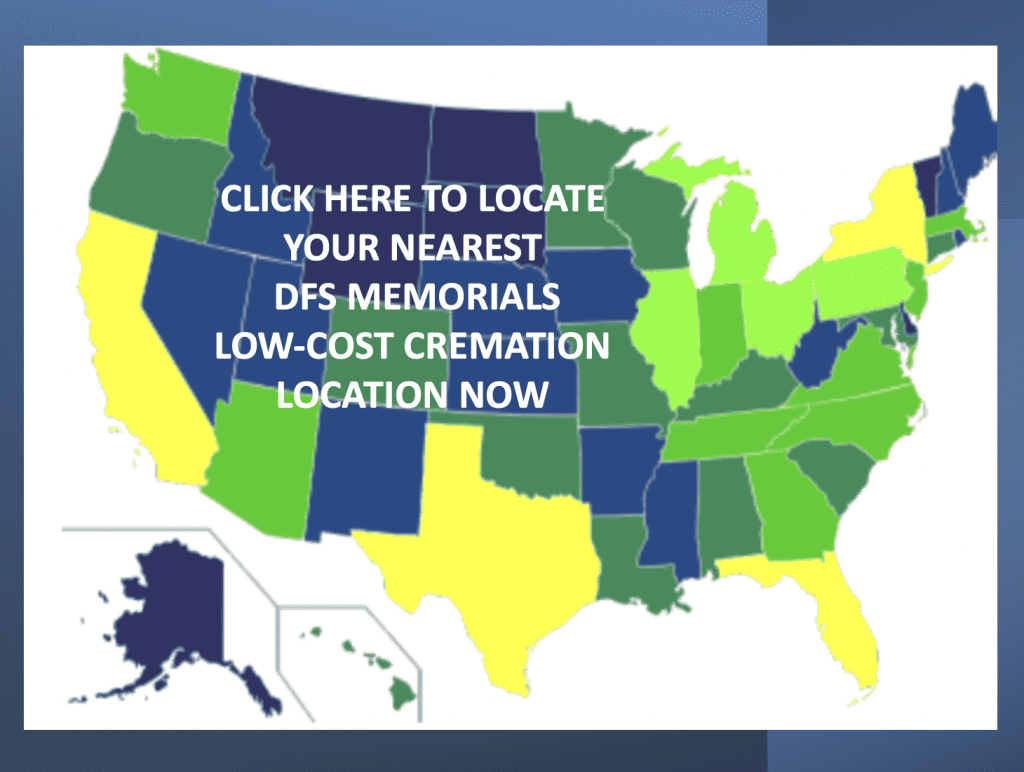
This article covers some of the basic aspects of funeral planning. You can plan ahead by purchasing a death care Travel Protection Plan. This plan covers all death-care expenses in the event a death occurs 75 miles (or more) away from your permanent legal residence. This is a simple-to-enroll, one-time payment of $450 that covers all services and expenses to transport the deceased home or arrange a cremation at the place of death & transport the cremated remains home.
To read more about the Travel Protection Plan and enroll for membership, visit Travel Protection Plan: Affordable Funeral Shipping Coverage.

This plan gives complete, affordable provision for funeral expenses for people who do travel away from home.
Setting up a Simple Cremation Plan
If you are looking to put in place a low-cost direct cremation plan to ensure your wishes are met and your surviving family saved the burden of death expenses, you can easily establish a simple and affordable cremation plan with DFS Memorials.
All DFS Memorials Cremation Service Providers offer a simple direct cremation plan at a very affordable price.
In most areas, a cremation plan can be set up for less than $1,000 and can be set up online or other the telephone.
Use the link below to locate a DFS Memorials provider near you and find out their direct cremation price and contact details.
Planning the funeral service ahead of time can make things slightly easier. Getting family members to openly talk and discuss matters ahead of time helps to relieve the immediate feeling of “what do we do first” when death actually happens.
Planning ahead can:
- Prevent your family members from having to make difficult decisions at very difficult times.
- Help to prevent overspending by family members who can only guess what you might have wanted.
- Let you decide for yourself whether to be buried or cremated.
- Enable you to choose the type of casket you wish to be buried in and what other ancillary services you require.
There are various ways that you can plan ahead.
Create your own funeral plan
You can simply decide upon your wishes, document your funeral ‘plan,’ and share this with your family, ready for when the need arises. In addition, you could ‘lay away’ the funds to cover your plan in an account that surviving family can access when the need arises.

A Totten Trust, or Payable-on-Death Account (POD), is a simple but logical approach to arranging funeral expenses. An account of this kind is easy and free to set up with your local bank. How it works is that you obtain from your bank a form for naming a POD beneficiary. You then write in the name and return the form to the bank, which completes this very easy transaction. It is not recommended that you name the funeral director as your beneficiary.
The beauty part of this arrangement is that the funds do NOT have to go through probate after your death. The funds will not be frozen unless your state and/or bank requires proof that any state death taxes have been paid. A bank employee can provide any further information you might need on this subject.
To read more about preparing a funeral plan with a P.O.D. account – visit our article What is the Best & Safest Way to Pre-plan for a Funeral?
These days there are even online funeral planning sites that enable you to document an outline of your wishes. We have also provided a checklist at the bottom of this page of things you need to consider if you are planning and documenting your own funeral wishes.
By checking around with funeral providers, you can estimate what your overall funeral expenses should be.
The important thing to remember is that the cost of a burial or cremation is not a fixed cost, as some time may elapse between making your plan and the implementation of your plan. You may need to re-visit and revise your plan in order to ensure your needs remain the same and the funds you have put aside still cover your needs.
Pre-need funeral insurance
Purchasing funeral insurance, sometimes referred to as Burial insurance, is another way that you can plan ahead. A funeral insurance plan from a reputable insurance agency can facilitate having your death care expenses taken care of.
Even if your estate consists of life insurance, real estate property, stocks, bonds, and other investments, they are not usually immediately turned into cash for our heirs. And if we have little or no estate to speak of, this is all the more reason to provide some kind of insurance so that our loved ones are not faced with the large financial burden associated with funeral expenses.
Burial insurance can be purchased through an insurance broker or from a funeral director who will write a “pre-need” policy covering specific products and services you feel are necessary. Some of these include the casket, burial vault or grave liner, grave marker, hearse, flowers, digging and filling the grave, and the actual cemetery plot. Embalming is only required if there is a public viewing of the deceased.
When making plans to arrange for funeral insurance, conferring with your spouse and children is a good idea. By doing this, not only are they made aware of your desire to make prior arrangements, but they will be able to provide helpful input.
Before making definite pre-need arrangements, it would also be beneficial to contact your attorney to be sure your arrangements are compatible with the instructions in your Will.
Pre-need plans from a funeral home
As mentioned, you can purchase a Pre-Need policy direct from a licensed funeral home, and these funds are usually held in trust. It is imperative to ensure that you deal with a reputable funeral professional who has been licensed specifically to sell Pre-Need Contracts.
Do check the terms of the state statutes affecting the sale of Pre-Need funeral contracts in your state, and ensure your contract is transferable or can be canceled. It is very important to ensure you are protected should your chosen funeral home go out of business.
Check that the policy is transferable and that you are protected should you move locale or state. Similarly, check that there is no penalty should you choose to cancel your policy.
It is also very important to ensure your family has a copy of and understands the full terms of your Pre-Need agreement. One of the common oversights in planning ahead is that surviving families are not aware of the existing contract with the funeral home and can have already arranged the funeral services before this comes to light.
Since each state has its own laws on funeral insurance and Pre-need policies, it is important to find out the law in your specific state. Take a friend or relative with you to help you with your decisions, and be sure to verify that the individual or company from whom you are purchasing the insurance is licensed.
It is also important to find out, in case you move to another state, that the arrangements you pay for can be moved to another funeral home at any time. In addition, be sure there are no blank spaces left in your contract that might be filled in later without your knowledge or consent.
To find out more about the state statutes governing pre-need agreements in your state, visit our ‘State Guide to Funeral Laws’.
Planning ahead for a veteran’s funeral
A free burial at a national cemetery is available to all United States veterans and some civilians who have worked for either the military or the US Public Health Service and their spouses. Expenses covered include a grave liner, grave marker, and grave digger’s fees to open and close the cemetery plot. However, no fees to the funeral home or mortuary are included.
Planning ahead – death benefits
Some unions provide death benefits, as do some social groups. The Railroad Retirement Board offers its members funds for use toward funeral expenses.
The Social Security Administration does allow the sum of $255 in a lump-sum payment that can be used toward funeral expenses. This money is available to the children of the deceased or to his or her spouse. It can, however, be an extensively bureaucratic process to access this fund.
If you need to learn more about planning for death duty and inheritance tax, check out our post Navigating the Complex World of Death Duty and Inheritance Tax.
Planning ahead checklist
Questions to consider when planning
- Do you want a cremation or burial?
- What kind of casket and/or urn do you want?
- Do you have a cemetery plot or columbarium for your interment?
- If you already own cemetery property, where is the deed kept?
- If opting for cremation, do you want your ashes scattered or interred?
- Do you require a funeral service?
- And if so, what kind of service?
- Do you require a Clergy or celebrant to preside over the service?
- What funeral transport do you require? How many cars and cortège?
- Would you like to specify the Music for the service?
- Would you like a visitation prior to cremation or burial?
- Do you desire an open or closed casket?
- Do you wish to specify what kind of Clothing or attire funeral guests should wear?
- Do you wish an Obituary to be published, and if so, what kind of Obituary?
- Do you want it featured in the local press and/or online?
- Do you wish to specify pallbearers?
- Do you want funeral flowers or Memorial contributions?
- For a veteran – veteran options, flag?
You can use our Funeral Resources Section for more articles on Planning Ahead, especially our Funeral Planning Category.



